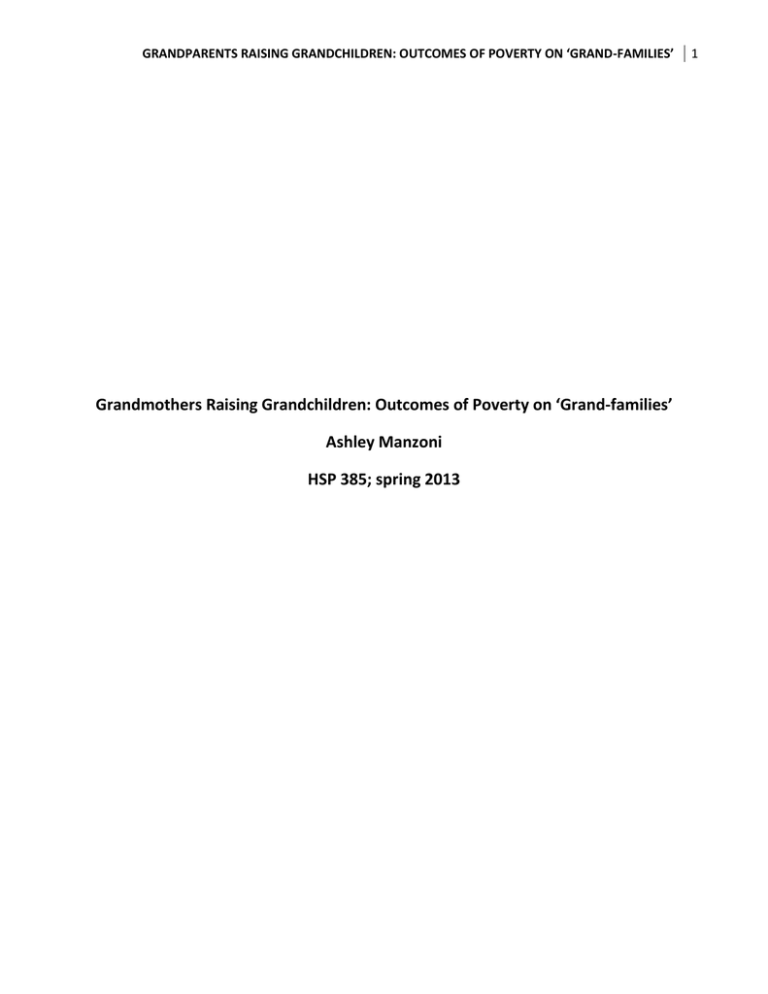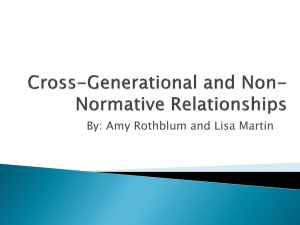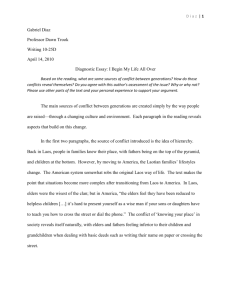research - Ashley Manzoni
advertisement

GRANDPARENTS RAISING GRANDCHILDREN: OUTCOMES OF POVERTY ON ‘GRAND-FAMILIES’ Grandmothers Raising Grandchildren: Outcomes of Poverty on ‘Grand-families’ Ashley Manzoni HSP 385; spring 2013 1 GRANDPARENTS RAISING GRANDCHILDREN: OUTCOMES OF POVERTY ON ‘GRAND-FAMILIES’ In recent years there has been an increase in the percentage of American households with grandparents as the primary caretakers of their grandchildren. Close to 5.5 million children in the United States in 2000 (about 7.7% of all children in the United States under age eighteen) are living with a grandparent (Mills, Gomez-Smith, & De Leon, 2005, p. 192). Although grandparents raising grandchildren is not a new phenomenon, the rapid growth of this population since the early 1990s calls for a closer look at demographic patterns contributing to stress within these families. Uncovering the factors that influence grandparent stress levels could help preventative programs in the future (Montoro-Rodriquez, Smith, & Palmieri, 2012). Out of the numerous factors that influence stress levels in grandparents raising grandchildren, socioeconomic status undoubtedly plays a role—but to what degree? There are many factors that highlight poverty within a ‘grand-family’: gender, access to healthcare, grandparent marital status, whether the family is three-generation (grandparents, parents, and children) or skippedgeneration (grandparents and children), race and ethnicity, and geographic location. With nearly one fourth of all grand-families living below the poverty line, research suggests that poverty plays a significant role in the resulting stress levels of grandparents (Baker & Mutchler, 2010). Of those grandparents raising grandchildren, a proportionately large number are grandmothers (Kelch-Oliver, 2011). For the purposes of narrowing the influence of gender variance, the focus will be on grandmothers due to the majority taking on this role, the lack of well-rounded research on grandmothers and grandfathers, as well as the benefits in validity as the population at hand is narrowed. “Grandmother-headed families’ lower economic positions are thus related to women’s lower economic status in society, which works to the detriment of 2 GRANDPARENTS RAISING GRANDCHILDREN: OUTCOMES OF POVERTY ON ‘GRAND-FAMILIES’ both women and the families for whom they care. Caring for children and grandchildren has implications for women’s work trajectories and earnings, and these in turn affect the economic situations of families that depend on women’s earnings,” (Prokos & Keene, 2012, p. 598-599). In families where the grandmother’s earnings are the primary means for living, gender roles and stigmas in society influence the high levels of poverty for grandmothers raising grandchildren by themselves. The stigma that grandparents raising grandchildren is a women’s or grandmother’s issue, likely impacts the dominating research on grandmothers, as opposed to the spectrum of other gender identities; this is an issue that was mentioned throughout the research on this subject and is worth noting for further research. In Park’s article, Factors associated with the psychological health of grandparents as primary caregivers: An analysis of gender differences, researchers found that living in poverty influenced higher levels of psychological distress in grandmothers (Parks, 2009). The sample for this study was collected from three waves of the National Survey of America’s Families through six-question interviews. In order to increase the generalizability of the data, researchers conducted the three waves of interviews from a random sample of 1,781 grandmothers. The large sample size and the randomization of interviews suggest a greater validity, as well. Analyzing the results, poverty status was compiled from household size, official poverty thresholds, and family income; four levels of poverty were defined. These findings suggest that socioeconomic status is correlated with self-reported grandmother stress levels; it is important to keep in mind that these levels of stress are self-reported, are subject to variability in perception. 3 GRANDPARENTS RAISING GRANDCHILDREN: OUTCOMES OF POVERTY ON ‘GRAND-FAMILIES’ Baker and Mulchler’s article, Poverty and material hardship in grandparent-headed households, claim that “children living in skipped-generation and single-parent households were the most likely to be living in poverty, with approximately 60% living in either poverty or near poverty,” (Baker & Mulchler, 2010, p. 953). The rates of poverty within skipped-generation grand-families and single-parent homes are higher than three-generation families, which suggests that a third variable is influencing rates of poverty: the number of caregivers. This third variable is potentially significant for the influence it could have on stress levels, as opposed to poverty itself. Poverty is very prevalent in grand-family households, as it is often an influencing factor in the child’s placement under a grandparent’s care. In one study from the journal, Marriage and Family Review by De Leon, Gomez-Smith, and Mills, the influence of social factors (race, sex, age, social support, physical health, and access to healthcare) on the level of grandmother stress was observed (Mills, Gomez-Smith, & De Leon, 2005). Many social factors, access to health care and social support in this case, can be precursors or results of high levels of poverty. Looking at several social factors and comparing the impact of poverty related factors versus health and racial factors can help in differentiating whether or not, one influences stress levels more than another. Relying upon a 1999 National Survey of America’s Families, followed by contacting individuals through a random-digit dial of collected telephone numbers from the survey, this study’s level of reliability is higher and more easily generalizable. Taking into account that many families may not have had telephone numbers (possibly linked to higher poverty level), this study addressed the possible skew in validity and chose to randomly sample those who did not have phone through door-to-door tactics. What this study found was that 4 GRANDPARENTS RAISING GRANDCHILDREN: OUTCOMES OF POVERTY ON ‘GRAND-FAMILIES’ factors such as younger age, un-married, receiving welfare, and/or having a usual place for healthcare led to an increase in grandmother stress levels. Of the 430,018 descriptive characteristics of grandparents collected from the sample, 69% were found to be below the poverty level, with 45% receiving welfare assistance. In order to compare the different social factors and their impact on grandmother’s level of psychosocial distress, the data was separated into four models: (1) demographic factors; (2) additional context of grandmother’s social support; (3) adding levels of grandmother’s physical health and access to healthcare; (4) and the addition of geographic region, poverty level and region, and race and region. The results of their findings suggest that living below the poverty level (B = -3.24) was associated with higher rate of stress in grandmothers (Mills, Gomez-Smith, & De Leon, 2005). In Laundry-Meyer, Gerard, and Guzell’s article, Caregiver stress among grandparents raising grandchildren: The functional role of social support, researchers focused on life satisfaction and generativity and their impact on caregiver stress levels (Laundry-Meyer, Gerard, & Guzell, 2005). As the sample size of this data set was 132 caregivers, the reliability should be taken into account; with a smaller sample size there is more room for error and the data is less generalizable. At the same time, the data was collected by “[recruiting] through social service agencies,” for those who met the study requirements within the northwest Ohio area. Since the sample was not completely random and was based off of who was willing to participate, the validity of this data sample should also be taken into account. The fact that this study chose to collect data through interviews allows for more in depth responses, which can be beneficial to the validity of research, as surveys can be easily misinterpreted. Researchers found that caregiver stress is negatively associated with generativity and life satisfaction and 5 GRANDPARENTS RAISING GRANDCHILDREN: OUTCOMES OF POVERTY ON ‘GRAND-FAMILIES’ that grandparent social support positively influences stress levels. These finding are significant for two reasons: first, the results suggest the importance of caregiver stress levels and their impact on overall life satisfaction; and second, the findings suggests that social support impacts grandmother stress levels as much as socioeconomic status. Another important question to be addressed when considering the impact of poverty on the stress levels of grandmother caregivers is geographic region, which has been found to be a third variable in the influence of poverty on stress levels. In Mills, Gomez, & De Leon’s article, Skipped generation families: Sources of psychological distress among grandmothers of grandchildren who live in homes where neither parent is present, the authors ask the question: “what is it about living in the Midwest compared to other regions of the United States that diminishes the negative effect of poverty on psychosocial distress for skipped generation grandmothers?,” (Mills, Gomez, & De Leon, 2005, p. 209). Researchers suggested that a less stressful lifestyle, a comparatively smaller proportion of families below the poverty level, and less degrading access to support resources in certain areas of the country could influence the impact of poverty on caregiver stress level. In the article, Becoming parents again: Grandparents raising grandchildren, researchers attempted to uncover challenges that influence the well-being of grandparents raising grandchildren. The study found that the grandparent’s relationship with their adult child and legal issues were the major factors that contributed to grandparent stress (Cooper, Hesser, Morrow-Kondos, & Weber, 1997). The article linked both of these factors to financial roots. For example, a positive relationship with an adult child resulted in higher rates of financial security. 6 GRANDPARENTS RAISING GRANDCHILDREN: OUTCOMES OF POVERTY ON ‘GRAND-FAMILIES’ Likewise, an interview with a grandfather described the link between financial and legal stress: “one grandfather said the reason he and his wife had not tried to adopt their grandchild was because they would lose all financial assistance from the state,” (Cooper, Hesser, MorrowKondos, & Weber, 1997, p. 42). Grand-families that are living in poverty have more trouble gaining legal custody of their grandchildren; this struggle and the stressors that follow, lead to higher levels of stress in grandmothers raising grandchildren. There are many factors such as presence of parents, life satisfaction, and social environment that could contribute to higher levels of stress and lower levels of perceived wellbeing in grandmothers. If poverty levels are linked to stress levels in grandmothers raising grandchildren, program planners may want to consider their methods when reaching out to grand-families and possibly increasing the focus on economic assistance (Musil, Gordon, Warner, Zauszniewski, Standing, & Wykle, 2011). Due to the increasing prevalence of grandparents raising grandchildren, this question’s importance could impact the stance of programs working to help grand-families. Based upon the research at hand it appears that living in poverty results in substantially higher rates of grandmother psychosocial distress; although there are third variables such as the number of caregivers, grandmother’s relationship with adult child, life satisfaction, and geographic location that suggest a compilation of factors. 7 GRANDPARENTS RAISING GRANDCHILDREN: OUTCOMES OF POVERTY ON ‘GRAND-FAMILIES’ Research Proposal Impacts of Family Structure of Grandchild Wellbeing within Grand-families 8 GRANDPARENTS RAISING GRANDCHILDREN: OUTCOMES OF POVERTY ON ‘GRAND-FAMILIES’ Research shows that families where grandparents raise their grandchildren are more likely to live in poverty. At a point in a person’s life where most are contemplating or saving up for retirement, the added legal, financial, emotional, and physical pressure that comes with parenting for the second time can push these families below the poverty belt. With close to 5.5 million children in the United States in 2000 (about 7.7% of all children in the United States under age eighteen) living with a grandparent, it is important to recognize the impact that these stressors place on the grandchild in particular (Mills, Gomez-Smith, & De Leon, 2005, p. 192). Family structure plays into the likelihood of living in poverty. In families where the grandparent raises the grandchild without the parents present over a third (38 percent) live below the poverty line and an added 15 percent are living on the brink of poverty (Kirby & Kaneda, 2002, p. 147). Much of the literature focuses on the stress that is brought on the family as a whole, particularly the grandparents; but what impact does living in a grandparent-headed home have on the grandchild? Within the larger context of scholarly literature, studies have attempted to uncover the impact of family structure on access to healthcare and grandparent psychological well-being, but little research has been conducted on the impacts of family structure on the psychological well-being of the grandchild. The stress and insecurity that accompanies the loss of a parent, or the anxiety and confusion over parental roles can both influence the behaviors of a child which can perpetuate into their future. The focus of this study is on the presence of the parents within these families and whether or not there are patterns in the child’s psychosocial stress levels in different family contexts including: skipped-generation families (families where the grandparent raises the grandchild and the parents are not present) 9 GRANDPARENTS RAISING GRANDCHILDREN: OUTCOMES OF POVERTY ON ‘GRAND-FAMILIES’ and three-generation families (families where the grandparent plays the role of primary caregiver, but the parent(s) are present). The purpose of this study is to examine the impact of family context (whether the family is skipped generation or three generation) on a grandchild’s psychological well-being: does family structure influence the psychological well-being of the grandchild in grandparent-headed homes? Based upon the literature that was utilized in preparation for this study, the hypothesis is that skipped-generation households will have the highest levels of psychological stress of the control groups. Expanding further, the hypothesis is that the absence of a parent will be negatively associated with psychological well-being. The study conducted will be pulled from the sampling frame of all students enrolled in third through sixth grade in Washington State out of the greater population of all American families with grandparents raising grandchildren. Of the elementary schools in Washington, ten will be randomly chosen and the data will be drawn from these ten. By randomly choosing ten schools, elements of location such as rural or urban status will be less likely to influence the results. Within each school that was randomly chosen, a list of children who have their grandparent as their primary contact will be collected. Anticipating some family’s lack of interest in following through with the study, every family on the list will be contacted with the phone number listed on their contact sheet; those contacted will compose the sample. Grandparents will then be stratified into two categories: skipped-generation families and threegeneration families. 10 GRANDPARENTS RAISING GRANDCHILDREN: OUTCOMES OF POVERTY ON ‘GRAND-FAMILIES’ Recognizing the limitations to this specific study is essential to the research process: the goal is to make conclusions that are representative of the data we collected, avoiding overgeneralizations that the data cannot support. In this specific study it is important to recognize that, although we are generalizing to all grandparents raising grandchildren, our sample was from schools in Washington. There could potentially be regional or cultural differences in choosing only Washington State that would make the data less generalizable. Since we will be interviewing each family, narrowing to a specific region is necessary for convenience and cost purposes. Furthermore, this study recognizes the limitation of voluntary participation. Those grandparents and grandchildren who have had more positive experiences may be more inclined to participate in the study than those who may report lower psychological well-being. For the purposes of keeping the study ethical and the families we are interviewing interested, compliant, and more dependable, this will be the most reliable method. It is also important to recognize the limitations of pulling from strictly the third through sixth grade. In narrowing the age of the grandchild the data will be less generalizable to all grandchildren being raised by their grandparents. Although the study decided to maintain this limiting factor in order to maintain consistency and avoid influencing factors, such as age differences in the length of time the child has lived with their grandparent as the primary caregiver; although we cannot assume that the age of the child will be directly correlated with the length of time the child has lived with their grandparent, we can limit the variance. The independent variable in this study is family structure and the dependent variable will be grandchild psychological wellbeing. In order to collect information regarding the independent variable (skipped-generation or three-generation), grandparents will be asked at 11 GRANDPARENTS RAISING GRANDCHILDREN: OUTCOMES OF POVERTY ON ‘GRAND-FAMILIES’ the start of the interview whether or not the parent is involved and to what extent. Since the extent of with which parents are present can be complicated the data will be operationalized by the restriction of how often the child sees the parent a week. If the child sees the parent two times a week or more, than they will be considered a three-generation family. Operationalizing the dependent variable, grandchild wellbeing will be a larger challenge, and one with more room for personal interpretation which can negatively influence the data. In order to measure psychosocial wellbeing grandchildren will be interviewed on their perceived happiness and fulfillment in different areas of their lives and the primary grandparent caregiver will be interviewed in order to substantiate and further support the grandchild’s interview. Closedended questions will be utilized in order to gain concrete information on social interactions, academic success and fulfillment, and how often the child feels anxious. Part of the privacy agreement that families will sign will include a section which will allow interviewers to record the interviews; with these recordings it will be easier for data analyzers to review themes and pull them out of the responses. Initial List of Interview Questions 1. When you are at school, how often do you feel anxious or nervous? 2. When you are at home, how often do you feel anxious or nervous? 3. Do you like to be at school or at home more? 4. (THREE-GENERATION) How do your grandparent(s) and parent(s) get along together? 12 GRANDPARENTS RAISING GRANDCHILDREN: OUTCOMES OF POVERTY ON ‘GRAND-FAMILIES’ 5. (THREE-GENERATION) Who would you go to for help if you were having trouble with homework? With friends? If you wanted a toy from the store? 6. What do you like about living with your grandparent? 7. What do you not like about living with your grandparent? Continued… Following the interviews with both the grandchildren and their grandparents will come an analysis of the data captured. Analyzers of the data will review the recording of the interviews and pull out themes in how often grandchildren reported feeling stressed or anxious, and compare the frequency in lower or higher stress and satisfaction levels between the differing family structures. After themes or patterns in the data have been operationalized, the correlation between parent presence and grandchild wellbeing using regression. In 1970 2.2 million or 3.2 percent of all children in the United States were raised by their grandparents. By 1997 that number had increased to 3.9 million or 5.5 percent of all children. Jumping to 5.5 million children in 2000, 7.7 percent of children in the United States raised by their grandparents, the rapid growth of this population calls for researcher attention. Differences in family structure and the presence of the parent or lack of, is important to consider when keeping the wellbeing of the child in mind. Does having the parent present or not present influence the stress levels and psychological wellbeing of the child? Or will the altered roles in responsibility between the grandparent and the parent influence the grandchild’s psychological wellbeing? The hypothesis based upon the research collected suggests that the presence of a parent will increase the child’s psychological wellbeing. Through 13 GRANDPARENTS RAISING GRANDCHILDREN: OUTCOMES OF POVERTY ON ‘GRAND-FAMILIES’ a random sample of Washington State third through sixth grade classrooms, sampling and interviewing individuals with grandparents as their primary caregiver, this study will attempt to draw some further research that will support or refute the hypothesis. 14 GRANDPARENTS RAISING GRANDCHILDREN: OUTCOMES OF POVERTY ON ‘GRAND-FAMILIES’ References Baker, L. A., & Mutchler, J. E. (2010). Poverty and material hardship in grandparent-headed households. Journal Of Marriage & Family, 72(4), 947-962. doi:10.1111/j.17413737.2010.00741.x Cooper, K., Hesser, J. L., Morrow-Kondos, D., & Weber, J. A. (1997). Becoming parents again: Grandparents raising grandchildren. Journal of Gerontological Social Work, 28 (1/2), 3546. Dolbin-MacNab, M. L. (2006). Just like raising your own? Grandmother’s perceptions of parenting a second time around. Family Relations, 55(5), 564-575. doi: 10.1111/j.17413729.2006.00426.x Kelch-Oliver, K. (2011). The experiences of African American grandmothers in grandparentheaded families. Family Journal, 19(1), 73-82. doi:10.1177/1066480710388730 Kirby, J. B., & Kaneda, T. (2002). Health Insurance and Family Structure: The Case of Adolescents in Skipped-Generation Families. Medical Care Research & Review, 59(2), 146. Landry-Meyer, L., Gerard, J. M., & Guzell, J. R. (2005). Caregiver stress among grandparents raising grandchildren: The functional role of social support. Marriage & Family Review, 37(1/2), 171-190. doi:10.1300/J002v37n01_11 Mills, T. I., Gomez-Smith, Z., & De Leon, J. M. (2005). Skipped generation families: Sources of psychological distress among grandmothers of grandchildren who live in homes where neither parent is present. Marriage & Family Review, 37(1/2), 191-212. doi: 10.1300/J002v37n01_12 Montoro-Rodriquez, J. Smith, G. C., & Palmieri, P. A. (2012). Use of community and school mental health services by custodial grandchildren. Family Relations, 61(2), 207-223. doi: 10.1111/j.1741-3729.2011.00690.x Musil, C. M., Gordon, N. L., Warner, C. B., Zauszniewski, J. A., Standing, T., & Wykle, M. (2011). Grandmothers and caregiving to grandchildren: Continuity, change, and outcomes over 24 months. Gerontologist, 51(1), 86-100. Park H. (2009). Factors associated with the psychological health of grandparents as primary caregivers: An analysis of gender differences. Journal of Intergenerational Relationships, 7 (2/3). 191-208. doi: 10.1080/15350770902852393 15 GRANDPARENTS RAISING GRANDCHILDREN: OUTCOMES OF POVERTY ON ‘GRAND-FAMILIES’ Prokos, A. H., & Keene, J. (2012). The life course and cumulative disadvantage: Poverty among grandmother-headed families. Research on Aging, 34(5), 592-621. doi:10.1177/0164027511423383 16







